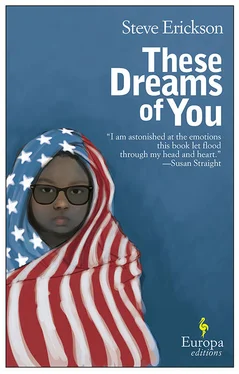“I’m not,” she says.
Notwithstanding the ministrations of $3,000 dentists, Zan and Viv have given up trying to break Sheba of her thumb-sucking. Amid everything else, they’ve decided it’s a problem that will have to resolve itself; in the meantime they’ve not so much learned the rule of Sheba’s thumb but that there is one — such as in the way she now takes her thumb from her mouth in order to fix on what she sees outside the pub window.
Sheba has been looting her way across London all morning, from the shops of Piccadilly to Covent Garden — all of it boring for the kids because Zan can’t afford to buy anything — but now a calm overtakes her so sudden and extraordinary that the father feels accosted by it. When she slightly turns in her seat, Zan turns to look as well, following the girl’s line of sight; with a start, his attention is as seized as Sheba’s. “What is it?” says Parker.
What appears to be a young African woman stands across the street watching Sheba back.
On her second day in Addis Ababa, after the long flight from Heathrow, Viv still isn’t clear about her course of action. She’s rejected any idea of going to the authorities. If the sensory bombardment of a new place hasn’t so much dispelled her depression and sense of crisis as distracted from it, as well there’s a new apprehension that she herself has trouble gauging in terms of what’s real and what’s paranoia.
The words of the last email from the investigative journalist whom she hired to find Sheba’s mother— . . suspicions of child-trafficking. . possibility that Zema was sold to you…difficult to be certain how seriously they take this. . — have gone through her head since she read them. Passing through customs at the airport, she braced herself. Checking into the hotel, again she waited for some polite invitation to a backroom from which she would never emerge. Once in her own small hotel room, she expected a knock at the door; opening her bags, she stared long and hard at the contents trying to remember exactly how she packed everything, if there’s a sign of anything out of place. She goes back and forth in her mind whether it’s best to keep out of sight or to keep in plain sight, and when she’s in plain sight, like the lounge or bar, she pays attention to whose sight she’s in, who lingers as long as she does, who leaves when she leaves.
The balcony of her room overlooks to one direction the other more upscale hotel in the distance. Its figure-eight drive circles two lush roundabouts before spilling out into a city impaled on a monumental broadcasting tower, time’s antenna; around a pool in the other direction, cabana umbrellas erupt like pale blue mushrooms. They’re nearly a color — a shade not quite green enough — to match Viv’s hair. Contrary to western impressions of Africa as hot, Addis is misty and cool. A mile and a half up, it’s closer to the sky than almost any city on earth, called by some of the locals Eucalyptopolis for the trees. Big thunderstorms roll in nightly, the clouds’ percussion to the chanting that Viv hears from the mosques.
Walking through the Tukul Bar, Viv is surrounded by a hubbub of languages. Transactions are made on all sides of her, some more dubious but no less explicit than others. Her first night, an arms dealer tries to pick her up; like genies, hosts and waiters appear and retrieve wishes and disappear.
Assuming she can’t locate the journalist, she decides to track down Sheba’s father, aunt and grandmother. She has no idea what to make of their silence to her last message, but the implications seem more myriad than obvious.
Viv’s driver takes her up Avenue Menelik II with its tree-lined promenades, past the Jubilee Palace toward the merkato, retracing the direction to the orphanage where she first came to get the girl almost two years earlier. The orphanage is a single building with three rooms, the largest including makeshift beds and cribs shared by two dozen children who range from babies to young adolescents. Each child has a single set of clothes, most have no shoes. The toddlers who haven’t learned to use the bathroom wear plastic garbage bags as diapers.
There are a few isolated toys and a television that gets no reception but is connected to a DVD player. A new DVD different from the same four or five that the children watch over and over is an event at the orphanage, with all the children gathered around to watch. The food is a kind of stew that the children eat with injera, the slightly sour Ethiopian bread with a sponge-like texture that Zan never has gotten used to back in Los Angeles. On Viv’s first trip to Addis, one night she took all the children out for burgers and Cokes; some got sick. Viv also brought with her antibiotics that she persuaded a number of doctors in L.A. to prescribe before she left.
There’s a dirt yard where the children play during the day within a surrounding fence and gate that’s manned by a guard, a quiet young man that the children love. When Sheba lived in the orphanage, in the middle of the night she crawled from her bed where two other children slept, left the building, ran on her little legs across the muddy yard through the night rain to the small outpost where the guard stayed, and slept at the orphanage gate. She would curl up on the guard’s chest and sleep through the night.
When Sheba left the orphanage, the guard couldn’t bring himself to say goodbye, and at first Viv felt it rude to press the matter. Twenty meters beyond the gate, however, the new mother stopped the car and led the girl by the hand to the gatehouse where the guard clutched her to him, tears in his eyes, and whispered goodbye.
On her arrival at her new home in the canyon, when Zan took the girl in his arms for the first time and lifted her from the backseat of the car, he couldn’t know that, pressed against his chest, she was reminded of the guard at the orphanage. Though in Viv’s absence Zan prepared the girl’s room, painting it pink and yellow, those first nights she would leave the only bed she’s ever had for her own to cross the house like crossing a yard of black rain, stealing to her new parents to curl in their arms like she did at the orphanage gate. Now on Viv’s return to the orphanage, the young guard that was too embarrassed by his despondency at Sheba’s departure remembers Viv the moment he sees her and his quiet face breaks into a smile as they embrace.
Everyone at the orphanage is happy to see Viv but no one offers answers to her questions. No one to whom she speaks will claim or confess to remembering where Sheba’s father, aunt and grandmother live. The woman who runs the orphanage makes a phone call; though Viv can’t be certain, since the conversation is in Amharic, she supposes it’s to the administrator of the adoption agency. On hanging up, the woman tells Viv, not unsympathetically, “It all just makes trouble.”
“I’m afraid the mother may already be in trouble,” Viv answers. “I’m only trying to help her.”
“But do you understand,” the woman says, “that should you find her, she may not know of the adoption, and that while of course the adoption is legal and final, still. . ” and the rest trails off.
“Still?”
“She might want back her child.”
Ever since Sheba came to be part of their family, now and then her combativeness crumbles long enough for Zan to catch her in a private moment. In such moments there is about her the palpable conviction that she’ll never possess the same love of her parents that they have for her brother. That she’s been passed from one party to the next out of love — from a single mother who couldn’t care for her to a paternal grandmother too old, to the orphanage and then Viv and Zan — is too exquisite a thing for the child to understand, or maybe anyone; but there’s no escaping how Sheba is short-changed, and it breaks Zan’s heart.
Читать дальше











